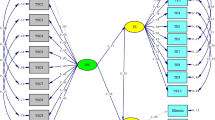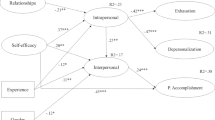Abstract
The purpose of this research was twofold: (a) to find out the dominant type of teaching/learning conceptions among second language (L2) teachers, that is, whether they generally tend to hold traditional or constructivist views; (b) to see if there is any relationship between L2 teachers’ traditional versus constructivist teaching/learning conceptions and their burnout level. Seventy-four L2 teachers were asked to fill out two instruments: the Maslach Burnout Inventory (MBI) and the Teaching and Learning Conceptions Questionnaire (TLCQ). Overall, the results from a T-test showed that teachers were more inclined towards constructivist conceptions of teaching and learning. Moreover, results from correlation analyses revealed that there is a significant negative correlation between teachers’ total burnout level alongside two of its subscales (Emotional Exhaustion and Depersonalization) and their constructivist conceptions of learning and teaching. On the contrary, our findings revealed a significant positive correlation between teachers’ total burnout level alongside two of its subscales (Emotional Exhaustion and Personal Accomplishment) and their traditional conceptions of learning and teaching. Furthermore, the results from regression analysis consisting of TLCQ factors showed that teachers’ constructivist conceptions could successfully predict lower levels of teacher burnout. The practical implications of the study were discussed.
Similar content being viewed by others
References
Bakker, A. B., Demerouti, E., & Schaufeli, W. B. (2002). Validation of the Maslach Burnout inventory – general survey: an internet study. Anxiety, Stress, and Coping: An International Journal, 15, 245–260.
Basturkmen, H., Loewen, S., & Ellis, R. (2004). Teachers’ stated beliefs about incidental focus on form and their classroom practices. Applied Linguistics, 25(2), 243–272.
Borg, S. (2003). Teacher cognition in language teaching: a review of research on what language teachers think, know, believe, and do. Language Teaching, 36, 81–109.
Breen, M. P., Hird, B., Milton, M., Thwaite, A., & Oliver, R. (2001). Making sense of language teaching: Teachers’ principles and classroom practices. Applied Linguistics, 22(4), 470–501.
Brouwers, A., & Tomic, W. (2000). A longitudinal study of teacher burnout and perceived self-efficacy in classroom management. Teaching and Teacher Education, 16, 239–253.
Brown, J. S., Collins, A., & Duguid, P. (1989). Situated cognition and the culture of learning. Educational Researcher, 18(1), 32–42.
Chan, K. W., & Elliott, R. G. (2004). Relational analysis of personal epistemology and conceptions about teaching and learning. Teaching and Teacher Education, 20, 817–831.
Chan, K. W., Tan, J., & Khoo, A. (2007). Pre-service teachers’ conceptions about teaching and learning: a closer look at Singapore cultural context. Asia-Pacific Journal of Teacher Education, 35(2), 181–195.
Cummings, C. (2000). Winning strategies for classroom management. Alexandria: Association for Supervision and Curriculum Development.
Dewey, J. (1897). My pedagogic creed. The School Journal, 54(3), 77–80.
Dorman, J. P. (2003). Relationship between school and classroom environment and teacher burnout: A LISREL analysis. Social Psychology of Education, 6, 107–127.
Driscoll, M. P. (1994). Psychology of learning for instruction. Boston: Allyn and Bacon.
Duffy, T. M., & Jonassen, D. (Eds.). (1992). Constructivism and the technology of instruction: A conversation. Hillsdale: Lawrence Erlbaum Associates.
Eren, A. (2009). Examining the teacher efficacy and achievement goals as predictors of Turkish student teachers’ conceptions about teaching and learning. Australian Journal of Teacher Education, 34(1), 69–87.
Evers, W. J. G., Brouwers, A., & Tomic, W. (2002). Burnout and self-efficacy: A study on teachers’ beliefs when implementing an innovative educational system in the Netherlands. British Journal of Educational Psychology, 72, 227–243.
Fernet, C., Guay, F., Senecal, C., & Austin, S. (2012). Predicting intraindividual changes in teacher burnout: The role of perceived school environment and motivational factors. Teacher and Teacher Education, 28, 514–525.
Freudenberger, H. J. (1974). Staff burnout. Journal of Social Issues, 30, 159–165.
Gatto, J. T. (1999). Universal education. Journal of Positive Futures, 1–10. Retrieved from http://www.focusas.com/Teaching.html. Accessed 10 Oct 2016.
Ghonsooly, B., & Raeesi, A. (2012). Exploring the relationship between creativity and burnout among Iranian EFL teachers. International Journal of Linguistics, 4(3), 121–134.
Goddard, R., O’Brien, P., & Goddard, M. (2006). Work environment predictors of beginning teacher burnout. British Educational Research Journal, 32(6), 857–874.
Hlynka, D. (1991). Postmodern excursions into educational technology. Educational Technology, 31, 27–30.
Jennett, H. K., Harris, S. L., & Mesibov, G. B. (2003). Commitment to philosophy, teacher efficacy, and burnout among teachers of children with autism. Journal of Autism and Developmental Disorders, 33, 583–593.
Lavian, R. H. (2012). The impact of organizational climate on burnout among homeroom teachers and special education teachers (full classes/individual pupils) in mainstream schools. Teachers and Teaching: Theory and Practice, 18(2), 233–247.
Mäkikangas, A., Hyvönen, K., Leskinen, E., Kinnunen, U., & Feldt, T. (2011). A person-centered approach to investigating the development trajectories of job-related affective well-being: A 10-year follow-up. Journal of Occupational and Organizational Psychology, 84, 327–346.
Maslach, C., & Jackson, S. E. (1981). Maslach burnout inventory research edition manual. Palo Alto: Consulting Psychologists Press.
Maslach, C., & Leiter, M. P. (1997). The truth about burnout: How organizations cause personal stress and what to do about it. San Francisco: Jossey-Bass.
Maslach, C., Schaufeli, W. B., & Leiter, M. P. (2001). Job burnout. Annual Review of Psychology, 52, 397–422.
McCauley, V., & McClelland, G. (2004). Studies in self-directed learning in physics at the University of Limerick, Ireland. International Journal of Self-Directed Learning, 1(2), 26–35.
Nunnally, J. C. (1978). Psychometric theory (2nd ed.). New York: McGraw-Hill.
Oro, L. B., & Ursua, M. P. (2005). Teacher irrational beliefs and their relation with educational uneasiness. Clinica-y-Salud, 16(1), 45–64.
Piaget, J. (1977). In H. E. Gruber & J. J. Vonèche (Eds.), The essential Piaget. New York: Basic Books.
Pines, A. M. (2002). Teacher burnout: a psychodynamic existential perspective. Teachers and Teaching: Theory and Practice, 8(2), 121–140.
Pishghadam, R., & Sahebjam, S. (2012). Personality and emotional intelligence in teacher burnout. The Spanish Journal of Psychology, 15(1), 227–236.
Pishghadam, R., Zabihi, R., & Shayesteh, S. (2013). The perception-practicum interface revisited: Life-wise language teaching perceptions and teacher burnout. Asia-Pacific Education Researcher, 23, 287–297.
Pressley, M., Harris, K. R., & Marks, M. B. (1992). But good strategy instructors are constructivists! Educational Psychology Review, 4, 3–31.
Schaufeli, W. B. (2003). Past performance and future perspectives of burnout research. South African Journal of Industrial Psychology, 29, 1–15.
Schaufeli, W. B., & Salanova, M. (2007). Efficacy or inefficacy, that’s the question: burnout and work engagement, and their relationships with efficacy beliefs. Anxiety, Stress, & Coping: An International Journal, 20, 177–196.
Skaalvik, E. M., & Skaalvik, S. (2010). Teacher self-efficacy and teacher burnout: A study of relations. Teaching and Teaching Education, 26, 1059–1069.
Taris, T. W., Schaufeli, W. B., & Verhoeven, L. C. (2005). Internal and external validation of the Dutch work addiction risk test: Implications for jobs and non-work conflict. Journal of Applied Psychology: An International Review, 54, 37–60.
Tavakoli, M., Zabihi, R., & Ghadiri, M. (2015). Adopting a mixed methods approach to assessing foreign language teachers’ teaching/learning conceptions and their language teaching biases. Current Psychology, 34, 791–802.
Vygotsky, L. S. (1978). Mind in society: The development of higher psychological processes. Cambridge: Harvard University Press.
Wittrock, W. C. (1985). The generative learning model and its implications for science education. Studies in Science Education, 12, 59–87.
Woods, D. (1996). Teacher cognition in language teaching: Beliefs, decision-making, and classroom practice. Cambridge: Cambridge University Press.
Author information
Authors and Affiliations
Corresponding author
Ethics declarations
Conflict of Interest
Authors declare that they have no conflict of interest.
Human Studies
This article does not contain any studies with animals performed by any of the authors.
Human Participants
All procedures performed in studies involving human participants were in accordance with the ethical standards of the institutional and/or national research committee and with the 1964 Helsinki declaration and its later amendments or comparable ethical standards.
Informed Consent
Informed consent was obtained from all individual participants included in the study.
Rights and permissions
About this article
Cite this article
Zabihi, R., Khodabakhsh, M. L2 Teachers’ Traditional versus Constructivist Teaching/Learning Conceptions and Teacher Burnout. Curr Psychol 38, 347–353 (2019). https://doi.org/10.1007/s12144-017-9610-z
Published:
Issue Date:
DOI: https://doi.org/10.1007/s12144-017-9610-z




